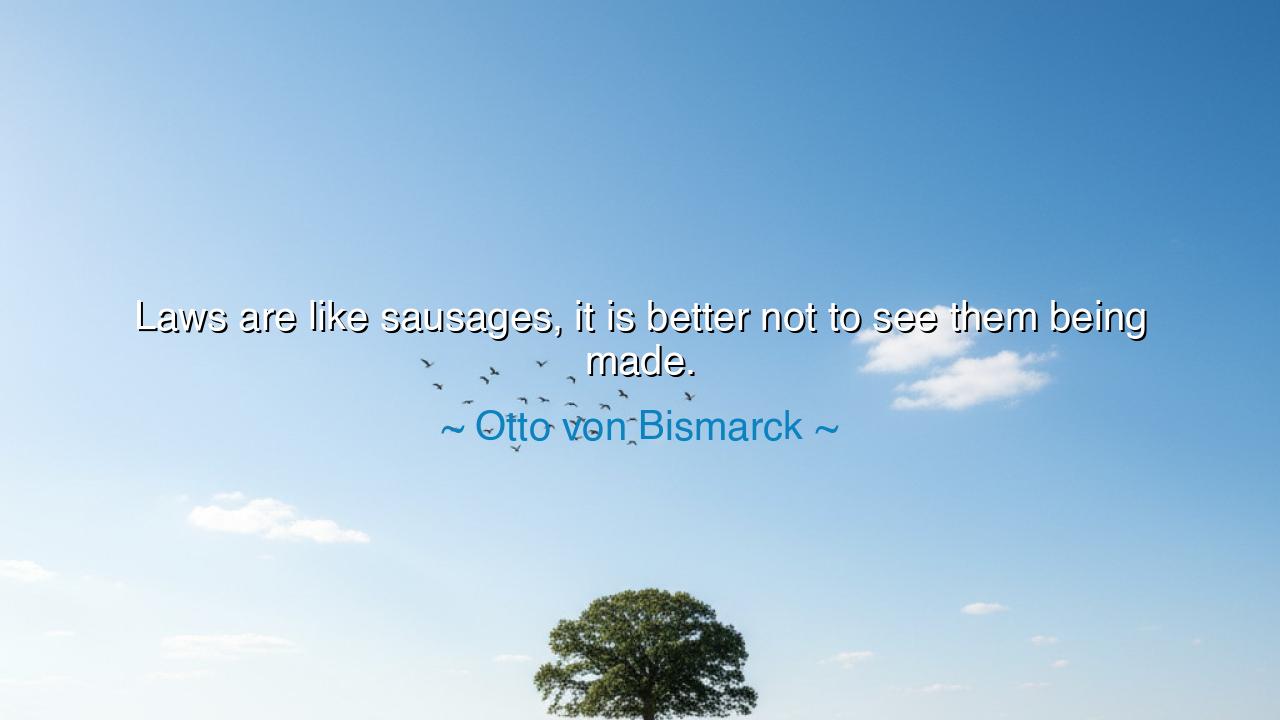
Laws are like sausages, it is better not to see them being made.






Otto von Bismarck, the Iron Chancellor of Germany, is remembered not only for his statesmanship but for his sharp tongue and unflinching realism. He once declared: “Laws are like sausages, it is better not to see them being made.” This phrase, simple yet piercing, unveils the uncomfortable truth about the crafting of human order. Bismarck, master of politics and compromise, knew that the process of making law was not pure, not noble in every moment, but messy, unseemly, filled with the pushing and pulling of ambition, bargaining, and imperfection. His words strike like the counsel of an elder who warns: do not mistake the smoothness of the finished thing for the turmoil of its birth.
The meaning of this saying lies in the recognition that though laws may uphold justice in their final form, their creation is a rough and unsightly affair. Behind the polished words of statutes lie the arguments of men, the deals of politicians, and the constant friction of competing interests. Just as a sausage, once cooked, nourishes without revealing the scraps and sinew within, so a law may preserve order without exposing the chaos from which it arose. Bismarck, in his wisdom, does not condemn lawmaking, but strips away the illusion of its purity. He reminds us that governance is a human art, born from imperfection.
The origin of this quote reflects Bismarck’s deep experience as a statesman. In uniting the German states and shaping the empire, he saw firsthand the compromises required in parliamentary chambers and council halls. He knew that noble ideals often entered negotiations but emerged battered, reshaped, or diluted. He likened this to the butcher’s shop, where noble meat is ground with fat and scraps until the final product is formed. For him, this was not cause for despair, but for sober understanding: to govern is to navigate imperfection.
History offers vivid testimony to his insight. Consider the drafting of the United States Constitution. To us today, it gleams as a sacred document, the foundation of liberty and governance. Yet its making was fraught with conflict. Delegates argued bitterly, statesmen compromised on slavery, and tempers flared until men stormed from the hall. The Constitution, though noble, was born of fierce debate, hidden bargains, and painful concessions. The process, if seen in its raw form, might have disheartened many; yet the final product became a pillar for generations. Bismarck’s words echo here: the sausage was made, and though its making was not pleasant, it has nourished nations.
There is something deeply emotional in this analogy. It warns us not to cling to illusions, not to imagine that the laws we live under descend from heaven fully formed. They are human creations, as flawed as the hands that craft them. And yet, there is hope in this recognition. If we understand that laws are imperfectly made, we can engage them with wisdom, reform them with vigilance, and forgive the struggle that shapes them.
To future generations, Bismarck’s saying teaches the virtue of patience and realism. Do not grow cynical when you see corruption or compromise in politics, for such things have always been. Instead, measure the final fruits. Ask not whether the process was pure, but whether the law, once enacted, protects the weak, preserves order, and advances justice. If it does, then the ugliness of its making is redeemed by the goodness of its effect. If it does not, then vigilance and reform must follow.
The lesson is thus clear: respect the final form of just laws, but remain sober about their making. In your own life, too, do not despise the messy process that leads to worthy outcomes. Families, communities, even personal growth are forged in struggle, conflict, and compromise, just as surely as nations are. Let your actions reflect this wisdom: participate in civic life, push for fairness, and know that while the making of law may be unpleasant, it is necessary for the nourishment of society.
So let Bismarck’s voice carry forward: “Laws are like sausages, it is better not to see them being made.” Accept the messiness, but do not abandon the table. For though the making may offend, the result—if tended with vigilance—can sustain a people for generations.






AAdministratorAdministrator
Welcome, honored guests. Please leave a comment, we will respond soon